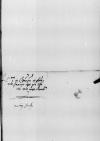Nolui committere, cum incolumis ⌊Viennam⌋ 26 Maii, ut in proximis Reverendissimae Amplitudini Tuae ex ⌊Ausserlitz⌋ datas ⌊⌋, pervenerim, et commode ob tempus liceret, quin quales quales(!) ad Reverendissimam Amplitudinem Tuam litteras exararem, tum de successibus meis, tum de ⌊Valdesii⌋ epitaphio, quod iam ipse affixum in quadam (ut vocant) capella, in divi Stephani aede hic vidi, pro quo, ut appenderetur 4 florenos et 23 grossos dissolutos esse non sine admiratione hic a dominorum ⌊Fuggarorum⌋ factore ms. factori(!)
⌈factorefactore ms. factori(!)
⌉ accepi. Nam profecto sine magno negotio et clavis non usque adeo politis aut pretiosis affixum est.
Quod autem in illis meis litteris, quae ⌊Mauritius⌋ pertulit, Reverendissimae Amplitudini Tuae significaverim duos solum florenos, ut affigeretur, impendisse dominorum ⌊Fuggarorum⌋ factor, accidit, quod certam mercedem, quam ex domino ⌊Georgio Hegel⌋ intellexi, tradidi oblivioni.
Fuit autem, ut ex nonnullis audivi, ipsum ⌊Valdesii⌋ corpus in eadem capella suspensum in scrinio vel urna, sed male conditum et pice oblitum. Quare cum gravem quendam et intolerabilem foetorem reddere sacerdotes senserint, nescio cuius consensu soli postea conditum est in eodem aediculo. Atque hoc de epitaphio.
Comites vero, quibus hinc cras in ⌊Italiam⌋ eo, unus est famulus domini ⌊Rosborsky⌋ canonici Cracoviensis, alter vero praecipuus, primus et fidelissimus comes erit Christus ⌊Iesus⌋, in cuius me tutelam tradidi non dubitans, immo toto pectore confidens eum fore ms. forem(!)
⌈forefore ms. forem(!)
⌉ adiutorem, liberatorem et ducem meum. Alios enim comites longius manere non potui nec consultum quispiam iudicavit or indicavit⌈iudicavitiudicavit or indicavit⌉, cum pro foribus iam sunt intolerabiles solis fervores et Procyon.
 BCz, 1597, p. 670
BCz, 1597, p. 670
Sunt praeterea, quae me haud mediocriter perterruerunt, nempe admiranda qua<e>dam rerum victualium caritas ⌊Romae⌋, quam non ex uno, sed complusculis fide dignis viris tam hic ⌊Viennae⌋, quam in itinere hidden by binding⌈[e]e hidden by binding⌉ inde proficiscentibus written over s⌈sbusbus written over s⌉ certo intellexi. Ego tamen, cum eo Christo duce pervenero written over ...⌈... illegible⌈...... illegible⌉oo written over ...⌉, clarius ipse ista videbo et sapientum, quid mihi faciendum sit, utar consilio. Illa tamen caritas, si in copistria (ut vocant) librarii munus assequi potuero, non usque adeo oberit, puto.
Nova, quae hinc scriberem alia rescivi nulla, quam quod uxor ⌊caesareae maiestatis⌋ ⌊Isabella⌋ e vivis excesserit eoque vestibus lugubribus serenissimi ⌊Romanorum, Boemiae et Hungariae etc. regis⌋ liberos indutos hic incedere vidi. ⌊Cuius⌋ adventus expectatur ad diem 4 Iunii, modo enim ⌊Pragae⌋ agit. ⌊Coniunx⌋ vero eiusdem serenissimi ⌊Romanorum etc. regis⌋ ante 5 hebdomadas hic filiam enixa est.
Quae quidem nova sunt omnia, quae hic certa sunt et ego Reverendissimam Amplitudinem Tuam latere nolui. Quam Deus Optimus Maximus iugiter incolumem florentem et felicem opto et precor ex animo.



 BCz, 1597, p. 672
BCz, 1597, p. 672